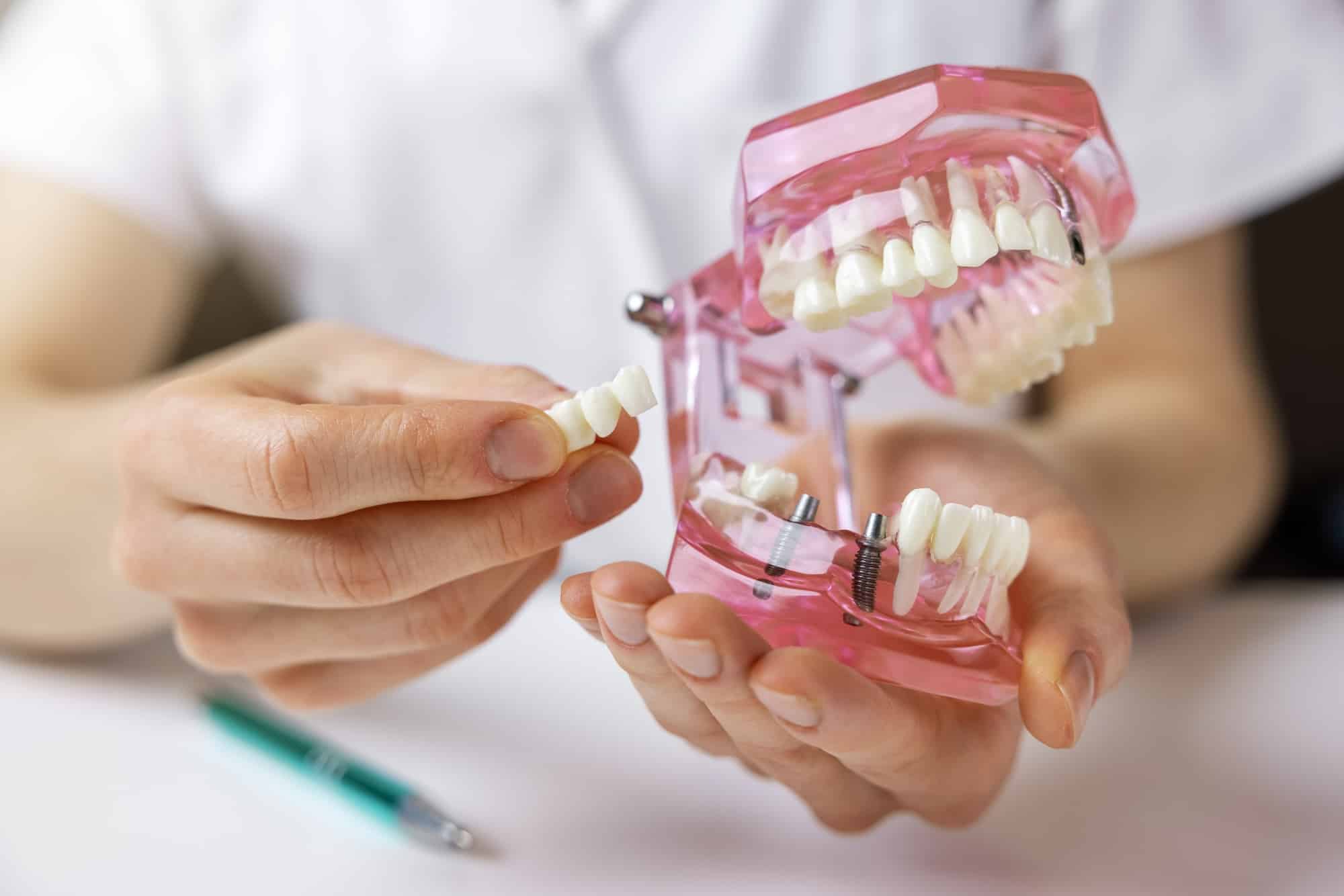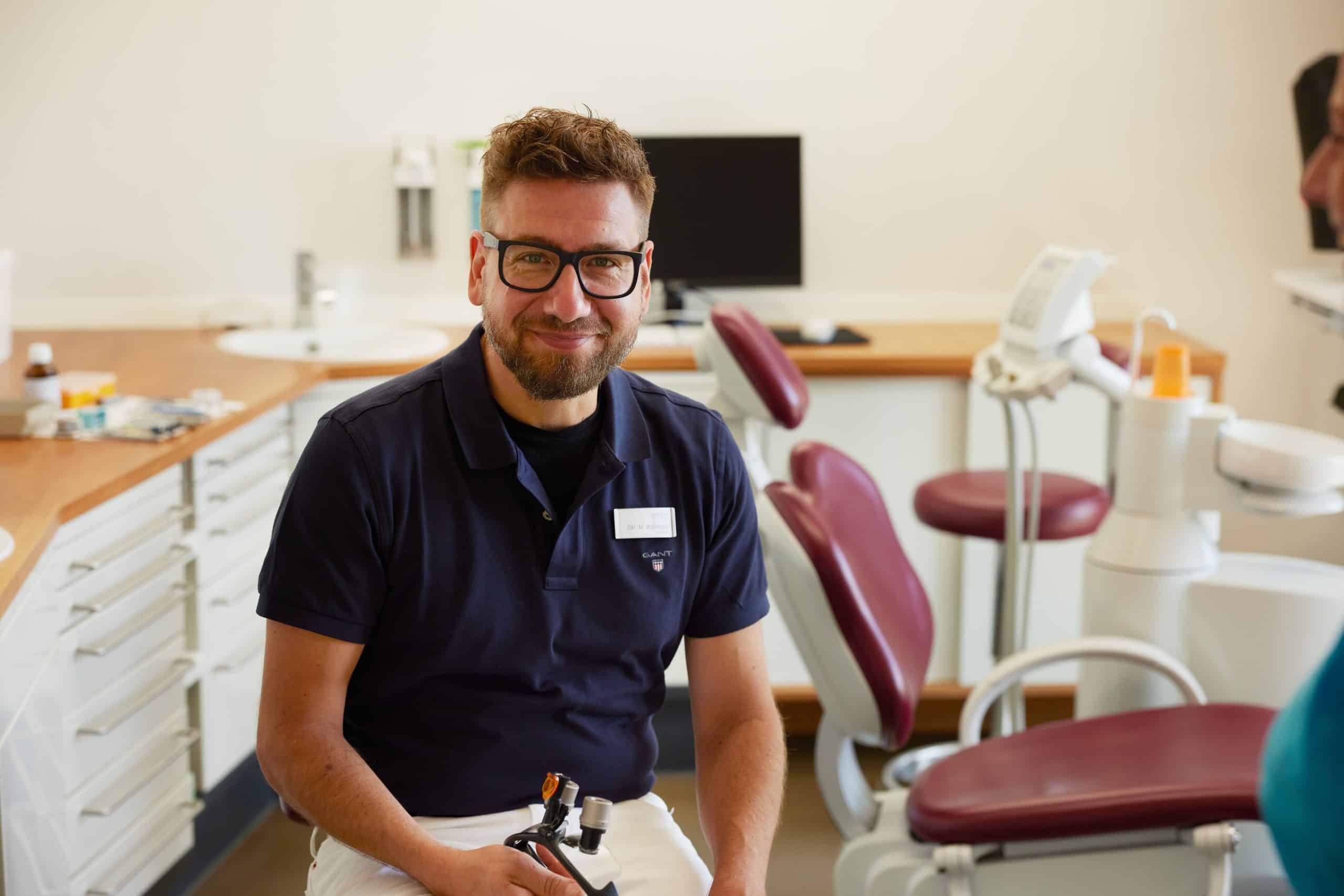
Dentures
Bridge or implant
Fixation to surrounding teeth or
an artificial root
Bridge or implant?
What is best for your dental health
A bridge is a fixed dental prosthesis that can be used to close a tooth gap after tooth loss. A bridge is usually attached to healthy neighboring teeth, which have to be ground down. Dental implants, on the other hand, are artificial tooth roots. They can be used to anchor various types of dentures directly in the jaw: for example, artificial dental crowns, but also partial dentures or dental bridges.
The smilin'' dental practice has put together an informative overview to help you decide whether to have a bridge or an implant.
Everything at a glance
Table of contents

Closing gaps with bridges
Dentures are indispensable
Leaving a tooth gap to its own devices after the tooth has been removed is not a good idea. Custom-fit dentures are always preferable - whether you opt for a dental bridge or another solution. The reasons for this are:
-
The denture supports the adjacent teeth and prevents them from tilting towards the gap.
-
The denture provides a counterpart to the opposing tooth in the opposite jaw. This prevents so-called elongation, i.e. the gradual emergence of the opposing tooth from the tooth bed.
-
Dentures avoid the unsightly appearance of an untreated tooth gap.
There are various options when choosing a suitable dental prosthesis. The visual appearance, the effects on your dental health and the longevity of the dentures must be taken into consideration.
A dental bridge can be used if one or more teeth have been completely lost. The aesthetic appearance of the bridge is usually good. This is particularly true when ceramic materials are used in production. They provide a deceptively realistic imitation of your natural teeth.
However, dental bridges have a disadvantage: due to the lack of an attachment option, the bridge is attached to the neighboring teeth. The neighboring teeth, which serve as abutment teeth, must be ground down for this. And healthy tooth substance is lost through grinding:
Completely natural and without waiting
The dental bridge
-
The adjacent teeth are ground down to a greater extent, especially in the case of larger tooth gaps.
-
This allows the fixation elements to be placed on top and permanently cemented.
-
This gives the construction more stability.
However, attaching a dental bridge to the neighboring teeth is not the only option. A bridge can also be fixed with dental implants in a particularly sustainable way. These are artificial tooth roots that are firmly attached to the jawbone.
The question "bridge or implant?" should therefore not lead to the conclusion that only one or the other is possible - both can also be combined. Implant-supported bridges have the advantage that the neighboring teeth are spared from grinding.
Instead of a bridge, however, artificial dental crowns can also be attached to the implants. This is a somewhat more complex, but usually more visually appealing solution.
Disadvantages of the bridge
Long-term dental health: bridge or implant?
Grinding down neighboring teeth, as is done when attaching a dental bridge, can have long-term health disadvantages. This is because the abutment teeth are weakened by grinding. As a result, they can become more susceptible to dental diseases. When placing dental prostheses using dental implants, however, no healthy teeth need to be ground down.
The load on the abutment teeth is increased by another circumstance: As a result of the bridge construction, they are exposed to increased masticatory pressure. This can further shorten the life expectancy of the abutment teeth.
Dental bridges have another disadvantage compared to implant-supported solutions. The dental bridge only fills the gap in the upper, visible part of the tooth. The bridge cannot replace the missing tooth root. The permanent absence of the root causes gradual bone loss. A dental implant, on the other hand, is anchored directly in the jaw and replaces the natural tooth root. It thus ensures long-term preservation of the jawbone.
A dental implant offers the possibility of permanently and firmly connecting all types of dentures to the jaw. Neighboring teeth remain unharmed.
With the help of an implant, we can replace missing teeth as follows, for example: We place a dental implant in the area of the tooth gap, which grows firmly into the jaw after some time. We then screw an artificial dental crown onto the implant. In this way, the denture remains directly connected to the jaw in the long term.
Dental implants for healthy teeth
Implants as a support for dentures
A dental bridge can also be attached with the help of dental implants - as can a partial denture. Your dentist will be happy to explain what is preferable in individual cases after a thorough examination.
However, when deciding whether to have a bridge or an implant, there is one thing to consider: It usually takes a few months for a dental implant to grow in firmly. In the meantime, the tooth gap must be filled with temporary dentures. The placement of a dental bridge that is not implant-supported, on the other hand, is possible within a short time.
Advantages of dental implants
5
-
Very firm anchorage for dentures
-
Outstanding esthetic results possible
-
Preserve the jawbone in the long term
-
Can prevent bone loss and periodontitis
-
Long shelf life

Don't leave your dental health to chance!
Please feel free to come to our practice or give us a call!
What our patients say about us
Customer testimonials
Advice is everything
We are happy to examine and advise you
The final answer to the question "bridge or implant?" is only possible if we take your individual dental situation into consideration. The experienced dentists at the smilin'' dental practice in Rheinfelden near Weil am Rhein and Basel will be happy to examine and advise you. Please simply contact us by telephone or using the contact form.
We take care of your smile.
Benefit from our additional services
In addition to high-quality dentistry, we offer a comprehensive range of services on request to make your visit to us as pleasant as possible.
-
SMS notifications
for reminders about check-up and prophylaxis appointments
-
Digital dental impression
for fast fabrication of precise dental prostheses in 2 hours.
-
Own laboratory on site
-
Long opening hours
for more flexibility when booking appointments
Book an appointment conveniently online
Make an appointment online now!
If you are interested in our dental health services, we will be happy to advise you: The smilin'' dental practice near Lörrach, Weil am Rhein and Basel awaits you. Please simply arrange your personal appointment by telephone or via our online appointment booking tool!

-
Fast feedback
We will get back to you within 48 hours!
-
Non-binding inquiry
This contact request is of course non-binding.
-
Personal contact person
A team member will contact you personally!


